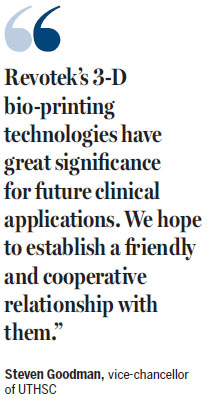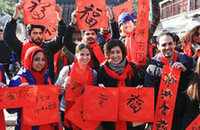University of Tennessee to team up with local medical professionals
The University of Tennessee Health Science Center plans to build strategic cooperative relations with biomedicine companies in Chengdu, Sichuan province, and establish a long-term mechanism to ensure steady technology and personnel exchanges in the field of 3-D bio-printing.
The latest 3-D bio-printing technology is bringing about a medical revolution that will change human life in the future, said Steven Goodman, vice-chancellor of UTHSC, the Memphis campus of the University of Tennessee, launched in 1911.
Goodman made the comments during his visit to the Chengdu High-Tech Industrial Development Zone from Feb 22 to 26 with six other professors from the university.
Charles Yates, a professor of pharmaceutical research, said that what he saw at the high-tech zone's biomedicine exhibition hall reassured him that it was the right choice to seek partnerships in Chengdu.
The provincial capital of Southwest China's Sichuan province has developed a solid foundation for the biomedicine industry, fostering a growing number of promising companies in the sector.
Revotek, established in September 2014, for example, announced in December last year a breakthrough in the clinical application of 3-D bio-printing technologies. The company was the first in the world to successfully implant custom-made, 3-D bio-printed blood vessels into animals.
The achievement will provide solutions to vascular obstructions and is expected to be used in the treatment of cardiovascular diseases, according to the company.
"Revotek's 3-D bio-printing technologies have great significance for future clinical applications. We hope to establish a friendly and cooperative relationship with them," Goodman said.
The company is currently working on establishing an international cooperation platform. It will set up overseas branches in countries including the United States and the United Kingdom to facilitate technical exchanges and cooperation to attract more professionals.
"We hope to make the 3-D printing of artificial blood vessels a new symbol of Chengdu, just like the giant panda, through cooperation with prestigious universities and research institutes worldwide," a representative of Revotek said.
During the five-day visit, Revotek, the University of Tennessee and the West China Hospital of Sichuan University reached an agreement to set up a cardiovascular hospital in Chengdu. The university will also establish a campus in the city.
In addition to the training and exchange of scientific researchers, Stephania Cormier, a professor of pharmacology, said that they also want to train more 3-D-printing professionals and entrepreneurs through the cooperation.
The Sichuan provincial government has remained focused on international technological communication for years and aims to build Chengdu into a biomedicine center in western China.















